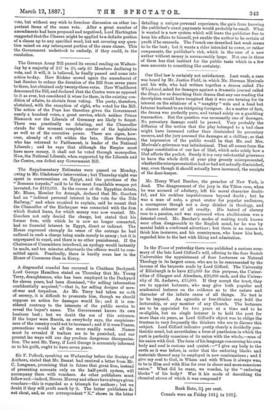The German Army Bill passed its second reading on Wednes-
day by a majority of 247 to 20, only 83 Members declining to vote, and it will, it is believed, be finally passed and come into action to-day. Herr Richter moved again the amendment of last Session to reduce the duration of the Bill from seven years to three, but obtained only twenty-three votes. Herr Windthorst denounced the Bill, and declared that the Centre were as opposed to it as ever, but considered it wiser for them, in the existing con- dition of affairs, to abstain from voting. The party, therefore, abstained, with the exception of eight, who voted for the Bill. The action of the Pope has therefore given the Government nearly a hundred votes, a great service, which neither Prince Bismarck nor the Liberals of Germany are likely to forget. There was practically no debating, and the Chancellor stands for the moment complete master of the legislative as well as of the executive power. There are signs, how- over, already of a rift within the lute. Herr Beunigeen, who has returned to Parliament, is leader of the National Liberals ; and he says that although the Empire must have more money, it shall not be voted through monopolies. Now, the National Liberals, when supported by the Liberals and the Centre, can defeat any Government Bill.


































 Previous page
Previous page